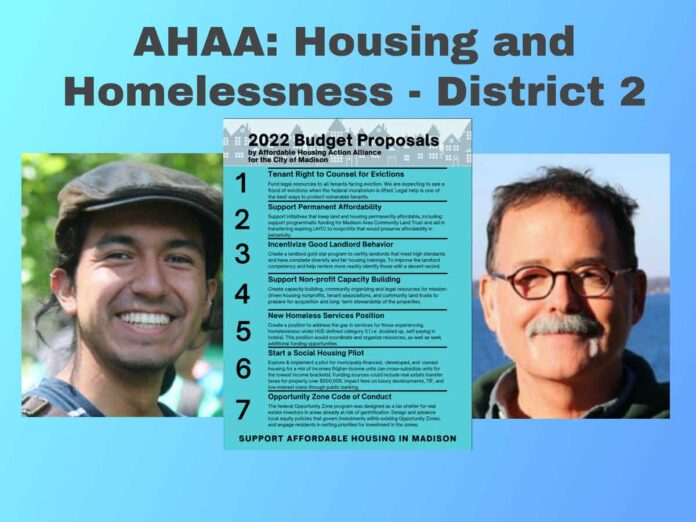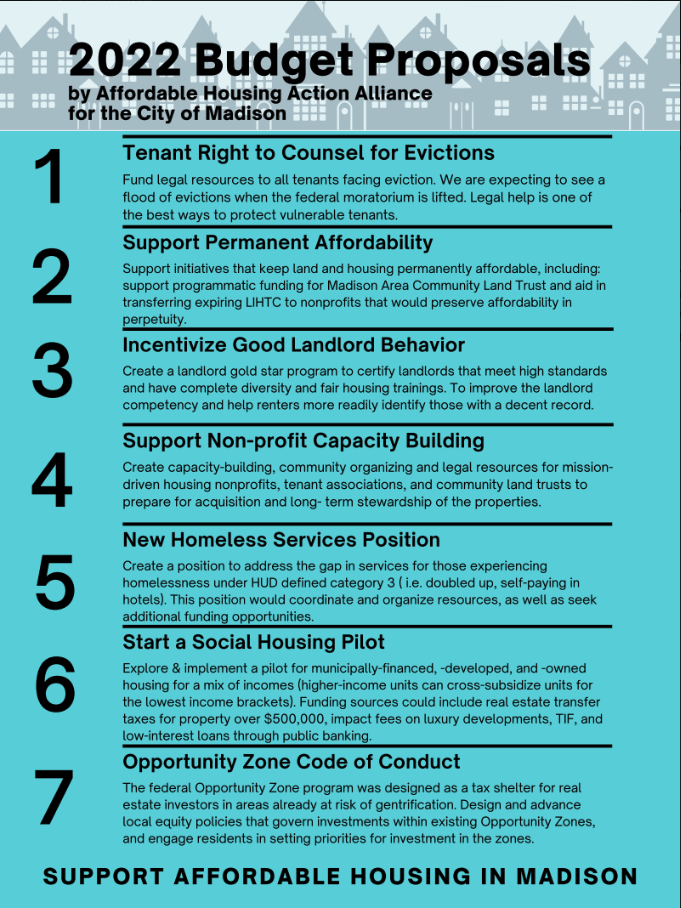The Affordable Housing Action Alliance asked the City Council candidates their views on several housing questions. Here are their answers for District 2
BENJI RAMIREZ GOMEZ
Describe What you see are the main housing problems in Madison.
My family lost the only house we ever owned in the 08’ financial crisis. Renters before, renters after, I have been subject to a diverse cast of landlords in our city.
The biggest burden on our city is the mass privatization of housing stock. Without reparations in the form of community ownership over housing and other infrastructure the working class will never be truly stable and safe.
New Men’s shelter proposed for E. Town Mall area.
As a receptionist at the YWCA, I field 3-5 calls a day of somebody looking for housing. My only choice is to point them to an extremely burdened and extensive Community Priority list that is rarely able to meet their needs in a timely manner. We need more shelters to meet the capacity needs facing the encampments on the Far East side right now.
Madison un-sanctioning McPike.
I do not agree with the city’s decision to decamp McPike park. The people living there were able to access community resources. Scattering the people living in the encampment undoes the relationship building community partners have worked towards. Further, it serves to create distrust for city from the homeless community, and further alienates the population from services meant to support them.
Proposals
1.Tenant right to counsel for evictions – The judicial system in the US is a system that is being used against the working class’ people’s interest. Without fully publicly funded tenant legal protection ( and the protection of public defenders) landlords will immorally evict and punish people already living in a marginal existence. Nobody had a “pandemic clause” in their lease; nobody should be penalized for situations out of their control.
2. Support permanent affordability – The largest issue we’re facing is a lack of stability for the working class. Without direct ownership, we will always be subject to the whims of the landlord. Cooperatively owned lands, houses, and markets would begin to reinforce the community’s autonomous capacities, and allow us to provide for everyone facing the extreme brunts of the pandemic economic fallout, systemic racism, and the impending climate crisis.
3. Incentivize good landlord behavior – The working class needs mechanisms that can hold immoral landlords accountable. The working class deserves to retain their housing, despite fluctuations or stagnations in income. We deserve the right to rent-control and collective ownership of the housing stock.
4. Support non-profit capacity building – Creating space for the agencies working to house people will have outstanding results. Currently, Entry to the various resources in Madison is a game of telephone, with tenants calling number from number. Establishing a hub for the different community partners to work will ease the flow of communication and facilitate growth of our capacity to house the homeless.
5. New homeless services position – This is one example of the positions that can be created if we were to Defund the Police. Having someone with direct oversight over the organization of the resources tenants can seek will allow us to end redundancies in the current process.
6. Start a social housing pilot – This pilot will come at a critical moment in Madison’s history. With the advent of MATCHA, the Save the Farm coalition, and more cooperative endeavors, now would be the time to create a city social housing pilot, one that is municipally run. This pilot will inform the future cooperative work that is before Madison.
7. Opportunity zone code of conduct – Opportunity zones remove the existing locale’s perspective and prioritization from the development process. By creating spaces engineered to allow residents to create the developments they want to see in their neighborhood, and allow for the development of communities to prosper.
PATRICK HECK
Describe what you see are the main housing problems in Madison.
Housing affordability and housing supply, which are obviously interrelated. I don’t believe that we can build our way into making all housing affordable, but we do need more housing across the income spectrum. The lack of housing, whether rented or owned, that is currently affordable to almost half of Madison is a complex problem that will take a variety of tools and approaches to solve. We should continue to invest the city and county affordable housing funds in projects that can leverage additional funding, e.g., WHEDA 9% tax credits, and we should continue to use the funds to support non-tax credit projects, as has been done recently with the city’s affordable housing fund. We also should facilitate and fund expansions of public housing, when not forbidden by the Faircloth amendment, and housing owned and operated by non-profits of various types, including Community Land Trusts. Whether funded through tax credits, WHEDA loan products, affordable housing funds, trusts, partially through public land banking, or other means, housing should be focused in areas that are transit-rich, have food access, and have both job and educational opportunities.
Give your opinion of the site for the new men’s shelter, which is proposed for the East Towne Mall area.
The location is not ideal but given that this shelter has the potential to quickly become a 24/7 entity with a full offering of service providers, I generally support the location due it being available now rather than later. We have a pressing need for a permanent men’s shelter to open asap. The cost of buying and converting this building is also comparatively reasonable. If the current location of the temporary men’s shelter on 1st Street was not committed to becoming the Public Market, I would be supportive of that location for a permanent shelter, assuming the building could be converted to a functional 24/7 shelter with services and transit access. Best case scenario would be for all levels of government, the non-profit community, and the business community to come together to fund a purpose-built 24/7 shelter in a more central area, but I do not anticipate that occurring in the necessary timeframe and in these times of municipal and private budget uncertainties.
Due to COVID, some residents without housing set up camp at McPike Park in Madison and had been staying there since last summer. The City of Madison is no longer allowing camping in that park and made the people staying there leave. Do you support this decision by the City of Madison? Please explain your position
I do not agree that those who remained unhoused should have been required to leave McPike Park. If the city had established a city sanctioned TPE somewhere in/near the city center, I would have generally supported relocating all residents at McPike Park to that new encampment. Such a TPE was not established, so per CDC guidelines, those not taking advantage of other housing options should not have been removed.
Please provide your opinion of AHAA’s housing agenda outlined in the attached flier. Below, write next to the corresponding number for each proposal whether you support it and give your reasons.
1 Tenant right to counsel for evictions – This should be a budget priority. That said, there are many other worthy items that should be budget priorities, so I’d have to balance all these competing interests as our financial situation becomes clearer.
2 Support permanent affordability – Yes, although there could be other land trusts and entities that could be worthy of supporting. We should require permanent or near-permanent affordability whenever we legally are able to do so.
3 Incentivize good landlord behavior – Yes. If city staff has the capacity to implement this, we should. If they do not, we should explore how to fund these new capacities.
4 Support non-profit capacity building – This should be a budget priority. That said, there are many other worthy items that should be budget priorities, so I’d have to balance all these competing interests as our financial situation becomes clearer.
5 New homeless services position – This should be a budget priority. That said, there are many other worthy items that should be budget priorities, so I’d have to balance all these competing interests as our financial situation becomes clearer.
6 Start a social housing pilot – I admittedly do not know about the ability of the city to establish such a model and pilot, but it sounds like a good idea in concept. I wonder if there could be state restrictions on how various funding sources can be utilized, e.g., impact fees and taxes, but it is worth exploring.
7 Opportunity zone code of conduct – Yes. The local community should have the strongest say in how developers are able to use this tool. Opportunity zones should build community, not just allowing developers or their investors to escape capital gains taxes.










Brenda we wish you could make money off this page as a full time job because we really miss the editorial pieces you used to do on city issues that just doesn’t exist here anymore.
Me too! $100-200 a month from advertising only pays for the costs. Sadly, my full time job and volunteering with Occupy Madison has taken up all my time and the readership I built up when I was unemployed is now back to where it was before I was just blogging. I keep hoping I will again have time for blogging some day soon.